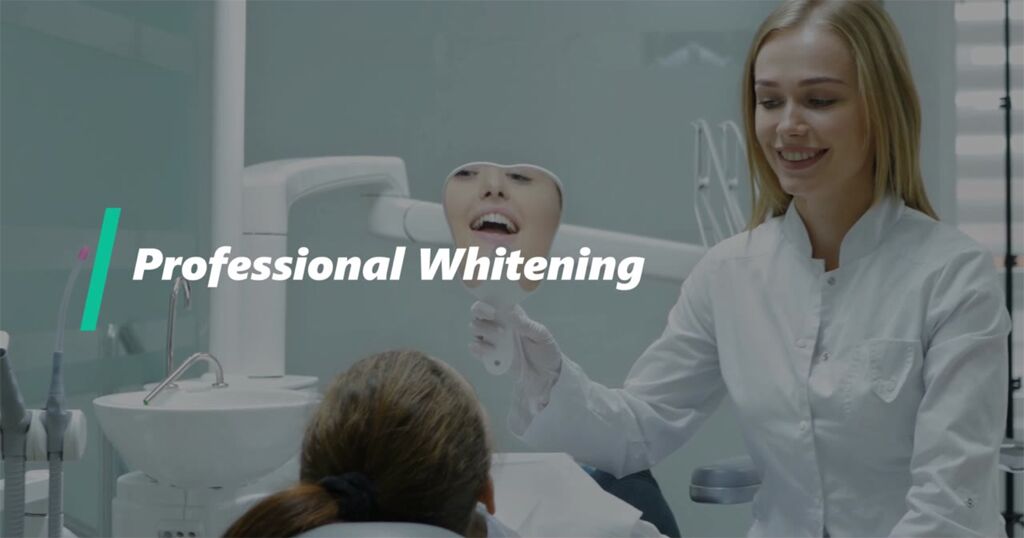
Time and constant use take a toll on our teeth and can result in blemishes that take the shine off your smile. Some drinks and foods can stain our teeth, which can also become tarnished as part of the ageing process.
Professional teeth whitening provides a solution to restore your smile – and your self-confidence. Whitening products are available over the counter or online but many people choose to have their teeth whitened by a dental professional.
Key advantages of professional teeth whitening? It’s more effective and comfortable than products like DIY teeth bleaching kits.
Ill-fitting DIY bleaching strips and gels and whitening trays may irritate your gums by leaking bleaching agent.
In 2019, the British Dental Association warned that over-the-counter and online products to whiten teeth could be “a waste of money” – less effective than professional treatment and taking longer, with the possibility of damage to teeth.
Professional whitening treatment removes stains from tooth enamel while lightening the colour of the underlying dentin.
A major advantage of professional teeth whitening is that the whole process is carefully monitored to ensure your safety, which enables the use of more powerful bleaching agents to achieve better results.
Dentists may also have access to technology such as ultra-violet (UV) lighting systems to intensify the whitening process.
What about whitening toothpastes? They may remove surface stains but most won’t lighten deeper discolouration or change the natural colour of your teeth, and they usually take several weeks to produce any visible results.
These toothpastes may also contain chemicals and abrasive materials that, like some bleaching kits, may be tough on tooth enamel.
The NHS and the General Dental Council (GDC) say teeth whitening is a form of dentistry that should only be carried out by GDC-registered dentists, dental hygienists or dental therapists.
In 2013, in a private prosecution (GDC v Jamous), the High Court confirmed that teeth whitening is a dental skill that can only be legally and safely offered by registered dental professionals.
The NHS specifically state that teeth whitening in a beauty salon by untrained staff or staff without dental qualifications is illegal, and also warns of potential oral health risks of DIY whitening kits.
There are two types of teeth staining – extrinsic and intrinsic.
Extrinsic stains develop when dark-coloured residue from foods or drinks builds up on the protein film that covers dental enamel. Other causes of extrinsic staining are smoking and poor oral hygiene.
Intrinsic staining – beneath the surface of a tooth – is more difficult to correct. It can happen as we get older and causes teeth to appear yellow as enamel thins, allowing more exposure of dentin, which yellows naturally with ageing.
Some people – particularly older adults – have problems with both intrinsic and extrinsic staining.
Teeth whitening is considered a cosmetic treatment and is only available on the NHS on medical grounds, such as a tooth that has become discoloured because the nerve has died.
However, professional teeth whitening brings oral health benefits as well as enhancing your appearance.
A good dentist won’t go ahead with teeth whitening without ensuring that your teeth and gums are healthy, and X-rays or digital scans may identify problems you were unaware of.
Another advantage of teeth whitening at the dentist’s is that you can get professional teeth cleaning ahead of the whitening process.
So, teeth whitening treatment by a dental professional will leave your teeth safer and whiter, and your dentist or dental hygienist can also advise you on how to keep your teeth clean and sparkling after whitening.
The results of teeth whitening may vary from person to person and can last from a few months to a few years. Smoking and drinks such as tea, coffee and red wine will diminish the whitening effect faster.
A single laser whitening treatment typically takes around an hour to produce dramatic results, with teeth many shades whiter. You can also whiten at home with custom made trays moulded to fit your mouth, this normally takes two weeks of an hour day to get a great result.
Teeth whitening achieves significant results because it lightens both enamel and dentin, and the treatment is customised to your specific needs to provide the exact level of brightness you’re looking for, in the areas you want it most.
Other advantages of professional teeth whitening include:
Supported by a good routine of oral hygiene – brushing your teeth twice a day and flossing daily – professional teeth whitening is long-lasting and reliable.
Although professional whitening may cost more than a single over-the-counter whitening product, it can work out less costly in the long run – you may find you have to buy multiple whitening products before you see any results.
However, teeth whitening isn’t appropriate in some cases – if you have gum disease, for example, or for dentures, veneers, fillings or crowns.
A dentist who offers teeth whitening can tell you whether this is the right cosmetic treatment to restore your smile and self-assurance.